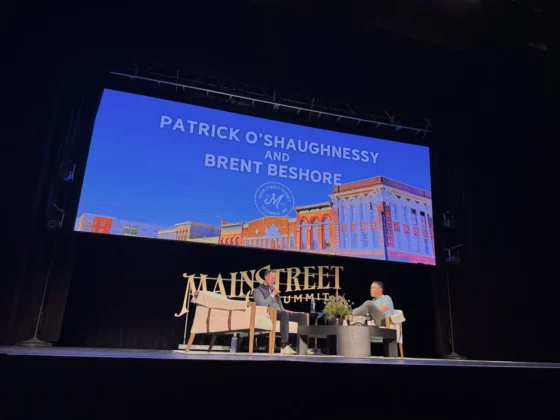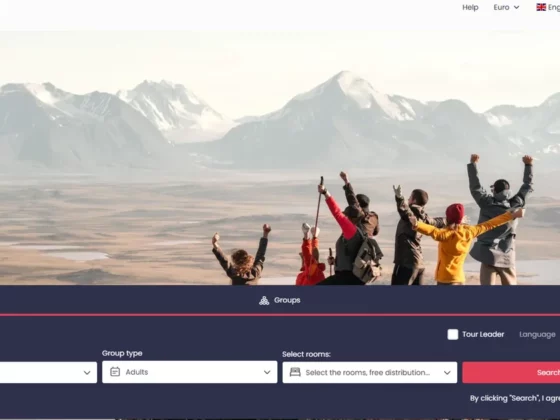Josiah Could energy management be even more important than time management? I had the chance to speak recently with and learn from two incredible hospitality leaders, Mariana Safer and Sara O’Brien, and I’ll link to that in the show notes. But something that came up in that conversation was the topic of energy management. It’s so important to our work as hospitality providers that I wanted to share it with you as a separate episode. So stick around to learn what this means for you and the people that you lead.
Josiah So you mentioned this thing of energy attracts energy, right? And, you know, I’m so curious, how do you get into that state in a way that’s productive for you, you know, in your day or in your career more broadly? I have so much to say about this.
Sara First of all, I think just to touch on what Mariana was saying that forcing yourself or pushing yourself is a necessary thing that has to happen. I look at it as always a short-term solution, because if you think about it, when you force yourself or push yourself, you drain yourself too. So eventually you have to come back and refuel. So in terms of energy, well, first of all, I’m a core energy-trained coach, and I work within a framework called energy leadership. So as woo as it sounds, It is like a neuroscience, a science-backed framework that really helps leaders and a lot of leaders. I work with scientists who have embraced this model. I’ve worked with people in multinational corporations that are, you know, very left-brain that still really grasp these concepts and use them in their day-to-day. So, We can bring energy into it, right? Mm-hmm. The way I think when I talk about managing your energy throughout the day or how you find ways to feel good in your work, I think of it as a gauge. And so usually what people do is they have a to-do list, and they’re just like, do this thing, do this thing, do this thing. And they don’t think about what things are on their to-do list. They get really like, yay, I get to do this. this is exciting, versus the thing that they’re like, oh, you know, and then instead of just recognizing it without judgment and saying, like, gosh, I actually really hate spreadsheets. Or, you know, I really hate whatever it might be. Not saying you have, you should avoid it or not do it, but kind of being like, okay, These are the things that don’t give me energy or feel me. These are the feel me. These are the things that do give me energy, right? Or feel me and learn how to incorporate more of those things. And when you can delegate the things that don’t give you energy when you can, and just pay attention to how you feel during the day. Because what I used to do would be like, Sarah, like, why can’t you just be more productive? Like, what is going on? Get your work done, you know, kind of like, giving myself a hard time about not completing things. And just not thinking about the fact like, well, of course, it’s hard for me to complete that task, because I find it really draining. And that’s okay. Not everybody’s gonna find the same things. Give them energy as the other person, you know, so I think it’s paying attention to those things, trying to incorporate more things into your day that give you energy and not judging yourself for things that don’t.
Mariana I feel the same way, Sarah. I think that balance between what you enjoy doing and don’t really love doing is really important to have self-awareness. And as someone who works remotely from home, there are certain strategies that I have. I’ve hit a wall. I’m going to go walk my dog. Or if you don’t have a dog, that’s okay. Just get some sunshine. proven to reset your brain when you go outside and get some fresh air. I’m a huge fan of meditation. I think even a 10-minute meditation session can do wonders, really for your thought processes. So knowing what works for you, I think is really important. And it’s okay, if that evolves and changes over time, too.
Josiah Marianne, I’m really fascinated by this on a personal level, but I also would love your take as a leader in your organization. What do you think about this for your teams and the people that work for you?
Mariana I think autonomy and flexibility is paramount. I think trusting your team to get the work done and being there as a resource for them as much as possible. That’s when I think the magic happens. I think flexibility is super important no matter what stage of life that you’re in. You know, if you want to go do a yoga class at five o’clock, or at lunchtime, or you need to pick up your child from school, or you have a doctor’s appointment to get them to whatever the circumstance is, There needs to be flexibility in the workplace because making someone sit somewhere from nine to five to me is ludicrous. I don’t see anybody getting the best output from their employees and then trusting them, making sure that the team has the tools to do their job and that you’re not overworking them, that you’re staffing appropriately, that you’re keeping them inspired one way or another. I think all those things are really important, but giving them the autonomy to get their job done and not micromanaging. I think in a remote world, these things are so important.
Josiah I love it, Sarah. What you said really resonated with me because I honestly, that’s the reason why I’m focused on hospitality daily now is I felt like there was a mismatch when I was a marketing leader at technology companies where it felt like the energies were off and I could push and I could, you know, I think you mentioned the spreadsheet example, like I could push and make it happen. but I wasn’t hitting that flow state. And I feel like now in the work I’m doing, I am hitting the flow state and I feel drawn into the work. I’m curious for those listening, how you advise people to think about what is just maybe a hard part of work that just has to be done. Nobody likes doing their taxes, but you just got to do it versus what might be a fundamental mismatch between what you’re wired to do and there’s more alignment there.
Sara Yes, I have some broad ideas around that. It’s very hard unless you’re talking to an individual to know, right? Like, oh, you’re in a mismatched situation or not. So let me just repeat the question. So it’s how do you know if you’re in a mismatched situation or if you just need to kind of balance out your day, right? Yeah. Can I ask you, how did you know?
Josiah Yeah, I mean, I think that you’re a great coach. So I think for me, I felt physically drained at the end of the day when I noticed a mismatch. between days I was just tired because I was physically tired versus there was an energy mismatch. And I think I noticed some of my colleagues getting a lot of energy from some of the corporate meetings that they were in, and I was just feeling totally depleted. And so it was a little bit of observation. I don’t know if that makes sense, but.
Sara Yeah, I relate to that so much. I remember in the corporate world, I enjoyed so many aspects of my career, but I remember walking into meetings and thinking, wow, that other person is really excited by this. And I feel like I need to fake it a little bit. Like, I can sort of enjoy this or get the enjoyment, but somebody else I can tell is really enjoying this, right? Oh, that’s a really loaded question, because I work with people a lot who are in parts of their career where they are questioning that, like, am I just needing to find more fulfillment and where I’m already at? Or do I need to think about, you know, do I make a change, which as a whole, like, making a big change is a lot, right? It’s not easy. And so there are so many, I would never want to just give someone general advice on a podcast of like, this is how you will know if it’s time to make a change because that, that’s a lot of pressure and responsibility. I think one of the things that it can be a really great guidepost for people as they’re making decisions for their life is, Am I making this decision, like if you’re thinking about what you want to do, am I making this decision out of fear? Or am I, is this something that I’m walking towards because I’m excited by it and I’m following something that I really value? Most people make decisions because they’re trying to avoid something or they’re afraid of the consequences of whatever the decision is that they make. So the more in your life that you can make decisions that are called value-based decisions, if I’m using a coaching term, versus out of fear, you’re going to just naturally progress down the path that’s meant for you. But it’s very hard to do that on your own.
Josiah It certainly is.






